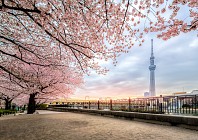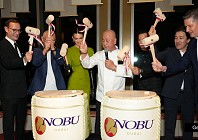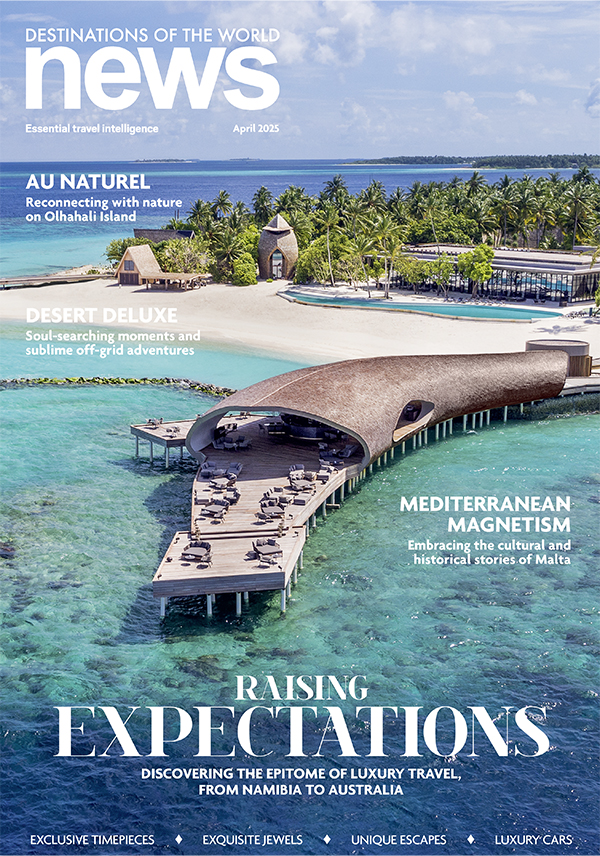What was the concept behind Zuma?
Zuma is a lifestyle restaurant, which means the most important thing is that you enjoy yourself. For me the most important reason that you enjoy yourself in a restaurant is because of the food. But besides eating excellent food, a restaurant should have other aspects that you like, such as design. The service and the whole package at Zuma make it a lifestyle experience. It’s not only about the food – its also about all the other little bits and pieces that make you go out and enjoy yourself with friends.
Before Zuma you spent a lot of time with Hyatt – how did you make the transition?
Hyatt is a fantastic company and I really learned a lot there. I started in ‘98 and opened a fine-dining restaurant in Cologne. I then opened Park Hyatt Sydney. I stayed for two years then they asked me if I was interested in opening the Park Hyatt Tokyo. I couldn’t say no. I fell in love with the Japanese culture and cuisine and the Japanese lifestyle. I stayed there for six years then decided to go back to my European roots. I decided that London at the time was (and still is) the culinary centre
of Europe, so that’s where I went.
Why else did you choose London?
It is a very competitive city but it is also a very rewarding city. You have old money, you have new money being made all the time and you have tourism. All of these things help to make a new concept successful. We would have had difficulty opening Zuma in Germany, but London is such a multi-cultural city, such a melting pot and the minds of the people are more open than other places. On the other hand, it’s very competitive. Every year around 400 restaurants open and 400 close. You really need to do your homework. At the time I had a feeling that Zuma would be successful, but I never anticipated that it would become a world brand.
Was Zuma an idea that had been in your head for a long time?
It started in Japan. Around that time I met with Nobu and we became friends over the years. He always stayed at the Park Hyatt Tokyo and we got talking and one day he asked me if I would like to join his company. I said no; I was honestly happy at Park Hyatt. When he opened his restaurant in London I heard about his huge success. He gave me the confidence that if I did something similar, it too could become a success.
Do people often compare you with Nobu?
Nobu is Japanese but he lives in the western world and he understands western flavours. For me it is the opposite; I am western but I understand Japanese flavours. Zuma is fundamentally different in terms of the food and the décor, but ultimately, the way he flavours his food and how he understands the Japanese/western creations and tries to make them work for the western palate – I think it’s the same. Nobu is the inspiration. I remember one time he came to Zuma and he was sitting at the counter and he said “Rainer, now you are the competition.” That was the biggest compliment someone could give me.
Will you ever open a restaurant in Tokyo?
I would love to go to Tokyo and I think Zuma would be very successful, but it’s not the right time. Japan has a very bad recession and Tokyo has too many restaurants. Even the very good ones have difficulty keeping themselves continuously packed. Zuma is a very expensive concept because you have the open kitchens and people are on show while they work. These dynamics create the atmosphere. If suddenly the chefs stop working because there isn’t enough orders, the whole buzz goes away.
But is it still a dream one day?
Absolutely, because it would also make my life easier. Finding Japanese chefs is very difficult. Every young chef has a master chef and in turn they have a master chef and so on. If this young chef loses his job for whatever reason, the master will support him and his family financially. If someone goes overseas without the approval of his master chef, when he comes back to Japan he has nothing. His master will not be there to support him. It makes it much easier to get chefs to come and work for us abroad if they trust that we are a good company and know that they can travel to Hong Kong or Miami, but if they want to come back to Tokyo, the doors are always open.
How important is that for young chefs?
It’s very important to them but its very important to me as well. As a westerner, I can tell anyone that my door is always open for them but because of the cultural differences, they won’t necessarily believe me. This is a way of building that trust. Over the six years I was in Tokyo, you never feel that you are completely accepted in the culture. You are tolerated in a way and the people are nice to you, but you never feel really at home.
How do Japanese chefs respond to what you are doing?
This is a very edgy question because my cuisine is not traditional. It is authentic but it is not traditional. A traditional Japanese chef would never do the things I am doing and my target market is not Japanese customers. When I came to Japan I ate the traditional cuisine and at first I found it bland and tasteless. After a couple of months, when my diet changed to purely Japanese cuisine, my palate adapted to the Japanese flavours and I started appreciating the real flavours and then I started loving it. But I asked myself how many of my customers in London would have been exposed to those flavours or to my experience. So I came back to my culture and I flavoured the food the way I would like to eat it. If I would have served traditional Japanese food I think my restaurant would be empty, or at least not the success it is now.
What is making Japanese cuisine so popular all over the world?
It’s a combination of many things. First of all it’s the informal eating style – its similar to the Chinese family style. You don’t have your typical appetiser, main course then dessert. The bottom line is that you can explore far more flavours if you have four dishes in the centre of the table that you can share with your friends. You suddenly have four appetisers instead of one. The whole package is better value for money. Also, Japanese food is traditionally made without dairy products. They don’t have milk, butter or cream, so it’s a much lighter cuisine and much healthier because the marinades and the miso and dashi soups are very healthy for your body and contain a lot of nutrition. You can eat and eat and when you leave you still feel good.
Do you speak Japanese?
Not as well as I used to when I lived there, but I communicate with my sushi chefs in basic Japanese and I tell them when it is good and I tell them when its not good. It’s nice to speak a little of the language and a very interesting learning experience.
What else amazed you about Japan?
Japanese culture is unbelievable. The best taxi drivers are in Japan. They are proud of doing a service. They don’t expect a tip – they are proud of bringing you from A to B. If they don’t find the address you don’t have to pay because they feel embarrassed because they didn’t do a good job. It’s a completely different mentality than the western world. Waiters don’t get tipped. Ask them what motivates them and they say it is their honour to serve you. That is the culture. My team have never let me down over six years. You don’t get people not turning up to work or complaining about long hours. It doesn’t happen. You treat them well and they treat you well.
Design is almost as important as the food in your restaurants – how much of your own style goes into the design?
When I met the designer for Super Potato and I saw it for the first time I felt so comfortable with the design. And that was even before I was doing my own thing. Zuma London for example is only designed with raw materials. It’s granite, glass, steel and stone. Look at my cuisine; there are not many ingredients but if you use the right materials and you use them properly, you don’t need many ingredients to make a product good. His design philosophy is so close to my food philosophy that they work in synch. There is a harmony in there and it is very important to me.
What’s next for Zuma?
In the Middle East, we are looking in Abu Dhabi and Beirut. I’m visiting Abu Dhabi to try to understand the city and the dynamics and where people go and find out where the good locations are. I don’t mind working with hotels as long as we have a freestanding entrance and we are on ground level or high up; not somewhere in the middle. Beirut is also somewhere we are considering at the moment, even though the situation is a bit tense again. We had a look at a couple of sites but we haven’t decided yet. There is no pressure. We don’t have a business plan in terms of opening new restaurants; we just do it when we feel it’s right and the team is right










